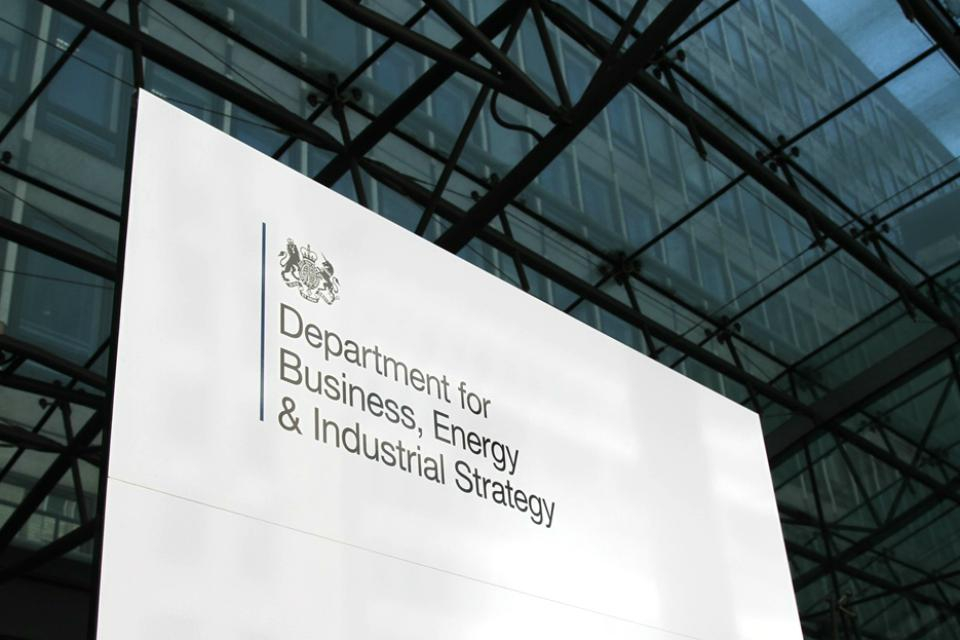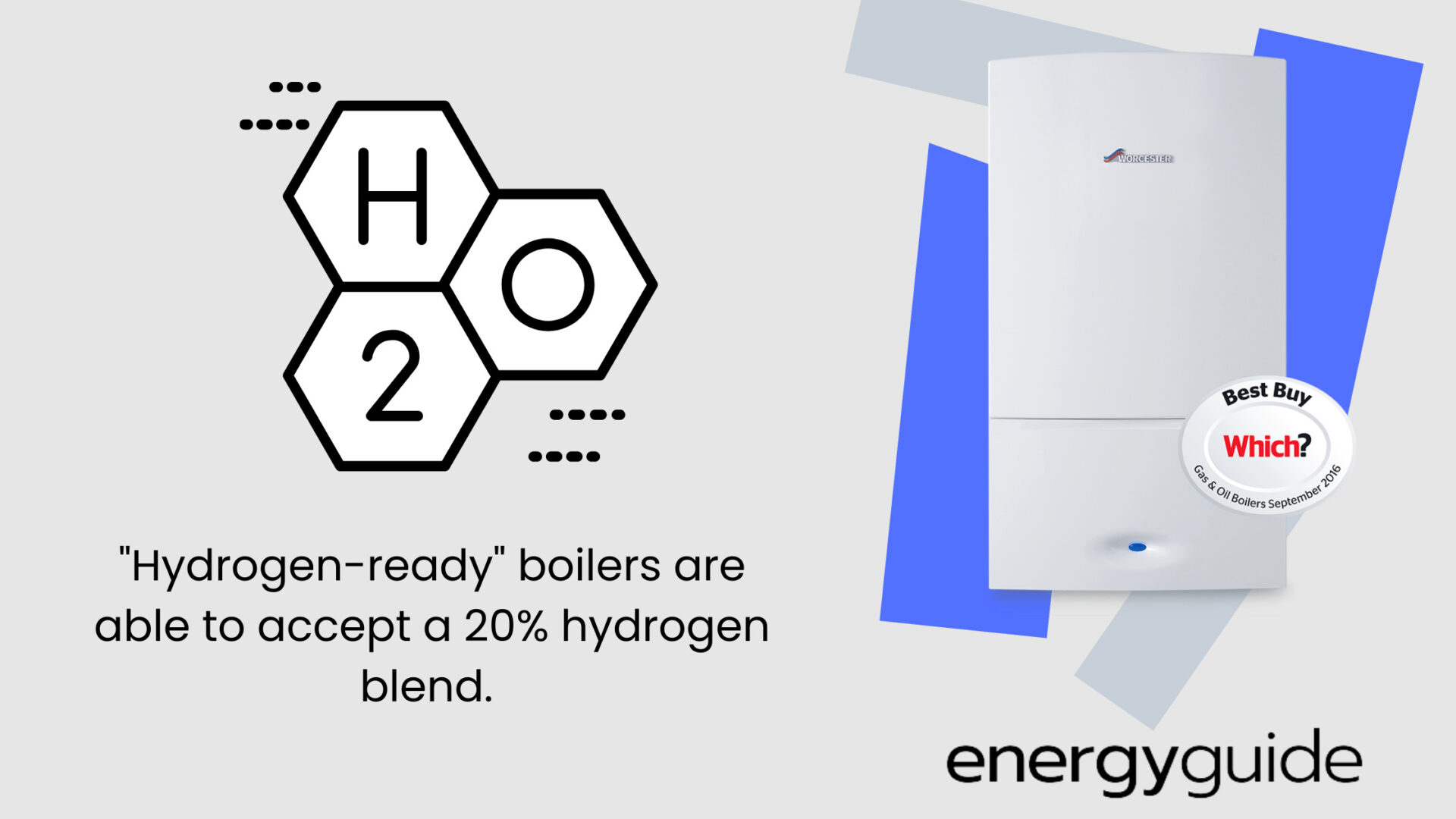Last Updated on January 21, 2026
One proposed path to net zero is using hydrogen boilers instead of natural gas boilers to heat your home. But what are hydrogen boilers and should you get one right now?
Homes and domestic buildings contribute to around 30% of greenhouse gas emissions in the UK. Such emissions occur through burning natural gas for space heating and hot water.
The UK has the oldest housing stock in Europe and around 85% of homes use natural gas for heating.
The UK government has committed to achieving carbon neutrality by 2050 as part of a global effort.
This ambitious goal necessitates significant reductions in carbon emissions across various sectors. These include transportation, energy production, and domestic heating—particularly focusing on gas boilers.
The UK government previously proposed plans to replace gas boilers with hydrogen boilers. However, whether hydrogen boilers will play a substantive role in heat decarbonisation is still unclear.
This guide explores everything you need to know about hydrogen boilers in the UK in 2026.
Key Takeaways:
- Hydrogen boilers work similarly to gas boilers but produce less emissions.
- The current hydrogen-ready boilers can only accept a 20% hydrogen blend.
- The government will decide in 2026 on whether and how hydrogen will contribute to reducing carbon emissions in home heating.
An important note about hydrogen boilers:
The UK government is actively exploring the potential of hydrogen-ready boilers as part of its broader strategy to reduce carbon emissions. However, specific policies and regulations regarding the widespread adoption and implementation of hydrogen-ready boilers are still under review. It’s important to stay informed about the latest government guidelines and regulations in this evolving field.

Is There A Ban On Gas Boilers?
The short answer is that there is no ban on gas boilers.
However, there are certain proposals to ban gas boilers in newly built properties from 2025 onwards, but there’s no confirmation on the same.
In a nutshell, that means if you buy a gas boiler today, it will likely run the course of its entire lifespan, e.g. around 15 years.
However, it’s likely that in the coming years, we will see more and more schemes and incentives to transition away from gas boilers.
That may include incentives to adopt heat pumps, like the gas boiler upgrade scheme launching on April 1st, 2022, and hydrogen fuel being fed into our homes via the existing grid instead of natural gas.
However, this process will likely happen in distinct stages, phasing in over many years.
Have you heard about the gas boiler ban and are wondering what the alternatives to gas boilers are? Read our complete guide to replacing your gas boiler with a heat pump.
What Are Hydrogen Boilers?
A hydrogen boiler is similar to the gas boilers we currently use in our homes.
It looks almost identical and uses most of the same components, including an ignition and combustion chamber.
However, instead of burning natural gas as fuel, it burns hydrogen gas instead.
However, heating your home with 100% hydrogen requires a hydrogen infrastructure, including a national gas grid that can support this, and renovations in your home, like swapping out your gas pipes for new ones.

Why is Hydrogen Better than Natural Gas?
As you may know, burning natural gas produces carbon dioxide, a major greenhouse gas contributing to climate change.
As a result, it’s fundamental to reform domestic heating in the UK to make it greener and cleaner.
That is where hydrogen comes in – hydrogen gas does not produce carbon dioxide when burned, instead it has one by-product – water.
This ability to burn hydrogen without producing any carbon dioxide makes it an exciting prospect for the UK government and its carbon-neutral goals for 2050.
Wondering which boiler manufacturers performed best? Check out our best boiler brands guide for the full rundown and if you are trying to determine who the best boiler installation company is, check out our Warmzilla and Boxt reviews.
How Do Hydrogen Boilers Work?
Hydrogen boilers work by burning hydrogen instead of natural gas.
Hydrogen boilers work in a very similar way to natural gas boilers. They burn the gas via combustion, which in turn creates hot flue gases the boiler uses to heat water.
You can store the hot water for later use and pump it around your radiators to warm up your home.
As hydrogen is a thinner gas, some parts of the boiler may differ slightly, including the flame detector and the burner.
Generally, hydrogen gas from a hydrogen storage tank or a hydrogen grid connection enters the boiler, mixes with air in a combustion chamber, and is ignited to create heat.
Are Hydrogen Boilers Available?
100% Hydrogen boilers are not yet commercially available in the UK, but there are several proto-types in development by leading boiler brands like Baxi, Worcester Bosch and Viessmann.
Hydrogen-ready boilers are currently available for purchase and installation, but you should be aware of a key distinction between hydrogen and “hydrogen-ready” boilers.
What is a Hydrogen Ready Boiler?
Currently, a hydrogen-ready boiler or hydrogen-ready blend is a boiler that can accept a percentage of hydrogen blended with natural gas, not 100% hydrogen gas.
These are called ‘hydrogen-ready’ boilers and usually accept 20% hydrogen. They are currently available from boiler manufacturers like Worcester Bosch and Viessmann.
You can typically identify these boilers as they will be marked with “hydrogen-ready” labelling. However, you can always consult with the manufacturer to be sure.
The government proposes a new definition to help avoid confusion among consumers and installers and ensure end-users don’t buy hydrogen blend boilers sold as hydrogen-ready boilers.
It intends to define hydrogen-ready boilers as gas boilers of any type (Regular, System or Combination) that are “out of the box” to be connected to the Natural Gas Network.
The boilers should be technically prepared to be converted, normally within 2 hours, into a safe boiler that can use 100% hydrogen as a fuel and maintain the minimum energy efficiency performance standard.
However, this definition is still under consultation, and the government intends to collaborate with industry to assess if any further refinements are required.
Did you know the efficiency of your boiler can impact the amount of energy it uses and ultimately impact your heating bill costs? Check out our guide to the best condensing boilers to learn more.
You may also find our review of the best eco-friendly boilers of interest.
How Much Do Hydrogen Boilers Cost?
Industry-leading boiler manufacturers like Worcester Bosch have made it clear that it’s their goal to make them on par with the price of current natural gas boilers.
That means that when they do become available, you hopefully won’t have to pay for any extras.
However, this will likely depend on whether the demand for hydrogen boilers will be as great as that of gas boilers.
Therefore, the costs remain uncertain until hydrogen boilers start appearing on the market once the government decides on their role in heating UK homes.
Check out our video on how to vet boiler brands/models in the UK:
What size boiler is right for your home? If you are considering a combi boiler, it is largely determined by the number of radiators in your home.
Check out our complete guide to new boiler installation here if you are wondering about the best type of boiler for your home.
How much may a new boiler cost? Are you considering converting from a conventional to a combi boiler? Use our boiler installation cost calculator to get an estimation.
What Are The Pros and Cons of Hydrogen Boilers?
Pros
- Seamless Integration – Hydrogen boilers can easily integrate into the existing gas network since they share the same operational principles as gas boilers. Hydrogen boilers can also be easy for homeowners to understand and use since they operate and feel like traditional boilers.
- Efficiency – Hydrogen boilers can produce more heat with less energy, making them more efficient than gas or oil boilers. The density of hydrogen allows it to pack more heat in a small amount of fuel.
- Eco-friendly – Hydrogen produces zero carbon emissions, and water vapor is the only byproduct. Hydrogen is also more sustainable and is usually available from renewable sources like wind power and solar.
Cons
- Uncertainties – Uncertainties remain on whether hydrogen boilers are viable for heating UK homes. They’re not widely available, and you may have to wait until 2026 to get a formal decision from the government.
- High Costs – Since the technology is not widespread, hydrogen boilers are currently more expensive, and you can expect to pay a premium price due to limited market penetration.
- Lack of Infrastructure – Although gas and hydrogen boilers operate similarly, using hydrogen requires some infrastructure changes, especially in distribution networks and pipework.
When Will Hydrogen Fuel Become the Norm?
As previously mentioned, the rollout of hydrogen using the current gas grid is a work in progress. There’s yet to be any confirmation in terms of dates.
In its latest response, the UK government points out that it plans to make a decision in 2026 on whether and how hydrogen will contribute to heating decarbonisation.
Despite waiting to take a formal decision in 2026, the Department of Energy Security and Net Zero (DESNZ) has already indicated that it expects hydrogen to play a limited role in decarbonising home heating.
Final Thoughts
Hydrogen can be an appealing and sustainable alternative to gas and other fossil fuels for home heating. However, uncertainties remain on whether it’s a viable option for decarbonising homes in the UK, and you may need to wait until 2026 to get a formal decision from the government.
Top manufacturers already offer functional hydrogen boiler prototypes that function as combi boilers and they can easily convert to 100% hydrogen operation once it’s widely available.
Sources and References
- https://www.gov.uk/government/consultations/the-future-homes-and-buildings-standards-2023-consultation/the-future-homes-and-buildings-standards-2023-consultation
- https://www.nao.org.uk/wp-content/uploads/2024/03/Decarbonising-home-heating-HC-581-SUMMARY.pdf
- https://assets.publishing.service.gov.uk/media/660c52b9fb0f770011ec66da/improving-boiler-standards-and-efficiency-consultation-government-response.pdf